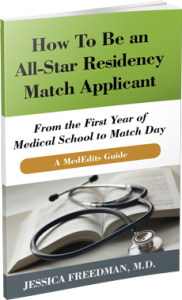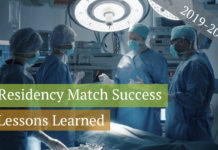
Your Medical School Experience
It is important to be organized during your first three years of medical school so you are ready to submit a stellar residency application in September of your fourth year. Deciding what specialty to pursue will depend on your interests and exposures, but you must also be able to evaluate objectively your competitiveness for the specialties in which you are interested.
Work experience
Most medical students do not have the time to gain true work experience during medical school unless a research position is paid. You are not expected to be employed during medical school!
Experience with people from different backgrounds
As a physician, you will work with people from different cultures and socioeconomic backgrounds. Residency admissions committees want to know that you have an open mind and can appreciate and recog- nize differences in people. In other words, they want to know that you are “culturally competent,” meaning you have the sensitivity, skills and aptitude to work with and care for people who have beliefs, tradi- tions, perspectives and ideals that are different from your own. Most medically relevant activities, except perhaps traditional research, can take place in a variety of settings that will allow you to demonstrate these ideals. Often clinical rotations are in a variety of hospitals that will also allow you to demonstrate cultural competence.
Other
If you have any unique interests such as music or the arts, seek out ways to merge your interests with medicine, if possible. Many medical schools and hospitals now have medical school and patient programs that use the arts as therapy. Or perhaps you have an interest in public or global health that you can pursue through these departments in your medical school. Seek out experiences that help you to nurture your interests and curiosities while bolstering your residency candi- dacy. Most medical school and hospital departments are thrilled when medical students participate in nonmedical programs and initiatives so seek out experiences that you find fulfilling.
Key qualities and characteristics for admission
As you select the experiences in which you will be involved, keep in mind the key qualities and characteristics that residency admissions committees are seeking in applicants.
Personal competencies, qualities and characteristics residencies value will vary slightly from specialty to specialty and program to program. But keep in mind this general list:
Able to accept constructive criticism
Able to cope with adversity
Able to lead
Able to think critically and analytically
Able to work as an effective team member
Able to overcome obstacles
Adaptable
Altruistic
Aware of others
Committed to his or her specialty
Compassionate
Culturally competent
Demonstrates interest in his specialty
Dependable
Desires to help others
Disciplined
Empathetic
Ethical
Intellectually curious
Kind
Mature
Motivated to pursue the specialty
Persistent


This is an excerpt from: How To Be an All-Star Residency Match Applicant: From the First Year of Medical School to Match Day – A MedEdits Guide
Copyright © 2013 by Jessica Freedman







